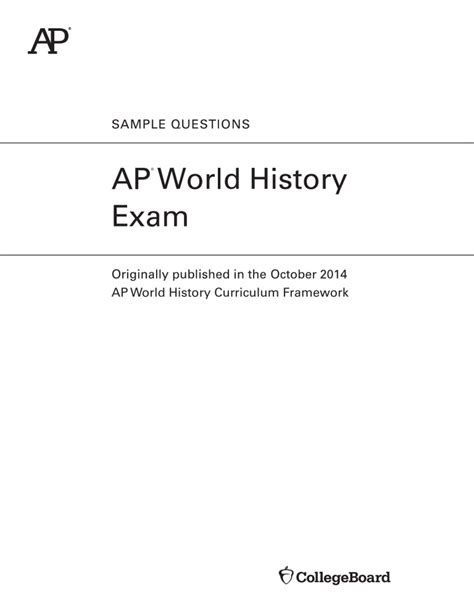Preparing for the AP World History exam can be daunting, but mastering the Free Response Questions (FRQs) is essential for maximizing your score. Here’s a comprehensive guide to help you tackle these formidable questions with confidence.

Understanding the FRQs
FRQs are essay-style questions that require students to demonstrate their knowledge and analytical skills. They typically consist of a primary source document, a question, and a prompt. Each question carries a potential score of 7 points.
To excel in FRQs, it’s crucial to:
- Read the question carefully and identify the key terms and concepts.
- Analyze the primary source to understand its purpose, perspective, and significance.
- Structure your response by providing a clear thesis statement, supporting evidence, and a conclusion.
- Write concisely and coherently, using precise language and historical context.
Key Concepts and Themes
Over the years, AP World History FRQs have covered a wide range of topics and themes, including:
- Political and Social Transformations: Revolutions, empires, and governance structures
- Economic and Technological Developments: Trade, industrialization, and environmental changes
- Cultural and Intellectual History: Religion, art, and ideas that shape societies
- Global Interactions: Globalization, imperialism, and cross-cultural exchanges
Step-by-Step Approach to Writing a Successful FRQ
- Carefully Read the Question and Source: Take your time to understand the prompt, question, and primary source.
- Identify Key Concepts: Note the major themes and ideas relevant to the question.
- Develop a Thesis Statement: Formulate a concise and specific statement that answers the question and provides a roadmap for your response.
- Organize Your Response: Structure your essay into paragraphs that logically support your thesis.
- Use Evidence from the Source: Cite specific information from the primary source to support your claims.
- Analyze and Interpret the Source: Go beyond simply describing the source; explain its significance and how it relates to the question.
- Draw Connections to Historical Context: Provide examples from other historical events or eras to support your analysis.
- Conclude with a Recap and Reflection: Summarize your main points and offer insights into the broader historical significance of the topic.
Comprehensive Table of Past FRQ Topics
To provide a comprehensive reference, here’s a table summarizing past FRQ topics from recent years:
| Category | Specific Topics |
|---|---|
| Political and Social Transformations | Revolutions, Empires, Governance Structures |
| Economic and Technological Developments | Trade, Industrialization, Environmentalism |
| Cultural and Intellectual History | Religion, Art, Ideas that Shape Societies |
| Global Interactions | Globalization, Imperialism, Cross-Cultural Exchanges |
Frequently Asked Questions (FAQs)
Q: How do I manage my time during the exam?
A: Allocate approximately 5 minutes for reading and planning, 20 minutes for writing, and 5 minutes for review and proofreading.
Q: What length should my FRQ response be?
A: Aim for a response of approximately 2-3 pages, depending on the complexity of the question.
Q: Can I use outside knowledge in my FRQs?
A: Yes, you may incorporate relevant historical knowledge beyond the provided source, but always cite your sources.
Q: How can I improve my writing skills for FRQs?
A: Practice regularly, seek feedback from teachers or tutors, and focus on clarity, conciseness, and historical accuracy.
Q: What resources can help me prepare for FRQs?
A: College Board’s website provides FRQ practice questions, past exams, and scoring rubrics. Textbook readings, online resources, and mock tests are also valuable preparation tools.
Conclusion
Mastering AP World History FRQs requires a strong understanding of historical concepts, analytical skills, and effective writing. By following these strategies, studying past topics, and practicing regularly, you can enhance your performance and achieve success on the exam. Stay focused, work diligently, and demonstrate your historical expertise to maximize your score.
